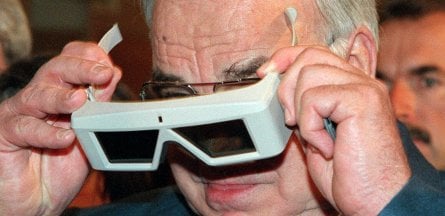Black books
The closest contact most Berliners get with African culture is dancing to reggae at Cassiopeia on Wednesdays, buying pot in Görlitzer park, or eating a savory Nil chicken on Grünberger Straße. Until the opening of A-U Headquarter, that is. Berlin’s first and only African bookstore provides background knowledge and a bit of authenticity to supplement the city’s profusion of poseur dreads. Opening out into Karl-Marx-Straße, the shop welcomes you with radiating orange and yellow walls lined with myriad books, handmade clothing, and artwork straight from south of the Sahara. Whether you want a book on the history of West African cuisine (complete with recipes!), the works of Nigerian author Wole Soyinka, or a Chinua Achebe novel, A-U Headquarter is a guaranteed source for information, literature, and theatre dealing with the under-known continent. Although the majority of books are printed in German, about a quarter are in English, and the odd French copy peeks out here and there. More than a shop, the space has become a thriving community since it was opened last November by a friendly Hamburgerin and her Sierra Leonean husband. Go to one of their monthly readings and experience some traditional cooking and music, make an appointment to have your hair extended, or simply hang out in the evening with the regulars in the back room. Check the website for details on upcoming events.
A-U Headquarter, Karl-Marx-Str. 21, Neukölln, U-Bhf Hermannplatz,
Tel 6290 0259, www.a-u-headquarter.de
ShopWindoz
It’s no secret that artists have been a bit slow on the uptake in the information age, many avoiding new technologies out of either stubborn principle or simple ignorance. This became clear to Darryl Feldman soon after he moved to Berlin from London two years ago. Speaking with artists and designers in Mitte and Prenzlauer Berg, he discovered that few had successfully reached an international audience. Coming from a soul-crushing product development job with Yahoo despite having studied illustration and graphic art, he was in the perfect position to shed his corporate chains and start ShopWindoz. Something of a cross between MySpace and eBay, the website enables the technologically impaired to sell their work through fully personalized shops in an interconnected community. The site provides a flexible environment, free of ads, where hundreds of small designers and artists who don’t have an outlet in Alexa can present their goods – from leather lingerie to trippy lighting fixtures – while maintaining their integrity. No matter what the product, you can guarantee it won’t be listed next to a whack-a-mole Flash game promising free tickets to a lumberjack drinking contest. Looking to sell your own ideas? Creating a new shop is currently free, so jump in the network while the offer lasts.
www.shopwindoz.com
Brille-iant
A naked face is a blank canvas, and no one is going to take you seriously in this city unless you frame it with a pair of decent Brille. Your glasses of choice will project your personality so pick with care: thick, blackrimmed spectacles convey a post-modern sense of irony, black wayfarers are de rigueur if you totally love art, or make them neon to show that you like to party until the afternoon of the day after tomorrow. (Whoa man, that sun is bright!) Now: no one except Italian tourists wear shades shouting couture initials unless … they are vintage. And besides, vintage follows the Berlin mantra of eco-style. Two years ago Uta Geyer, herself a glasses wearer, set the trend in Prenzlauer Berg with Lunettes, a small boutique full of hand-picked antiques from the 20th century: vintage designer (Ray Ban, Christian Dior), costume sunglasses and frames for prescription glasses, all in mint condition and all oh-so-reasonably priced. Optiking followed suit: as palatial as the name would suggest, the shop houses a plethora of bargain-priced styles from the 1970s, 80s and 90s, that manager Carsten Dennhardt has had restored. Gold glittery sunnies, Jackie O-style Christian Diors, skiing wraparounds and what seems like a museum on the history of Ray-Ban. Bug-eyes are fashionable this summer!
Lunettes, Marienburgerstr. 11, Prenzlauer Berg, U-Bhf Eberswalder Str., Tel 3408 2789, www.lunettes-brillenagentur.de; Optiking, Eberswalder Str. 34, Prenzlauer Berg, U-Bhf Eberswalder Str., Tel 4737 2488, www.optiking.com



 Please whitelist us to continue reading.
Please whitelist us to continue reading.